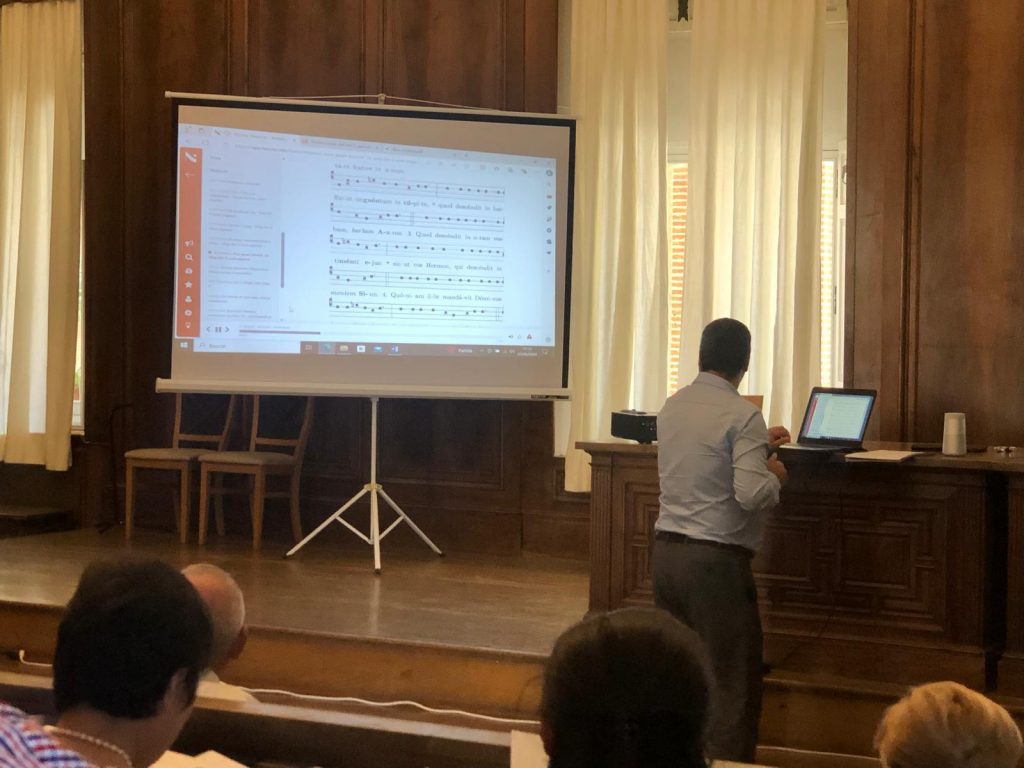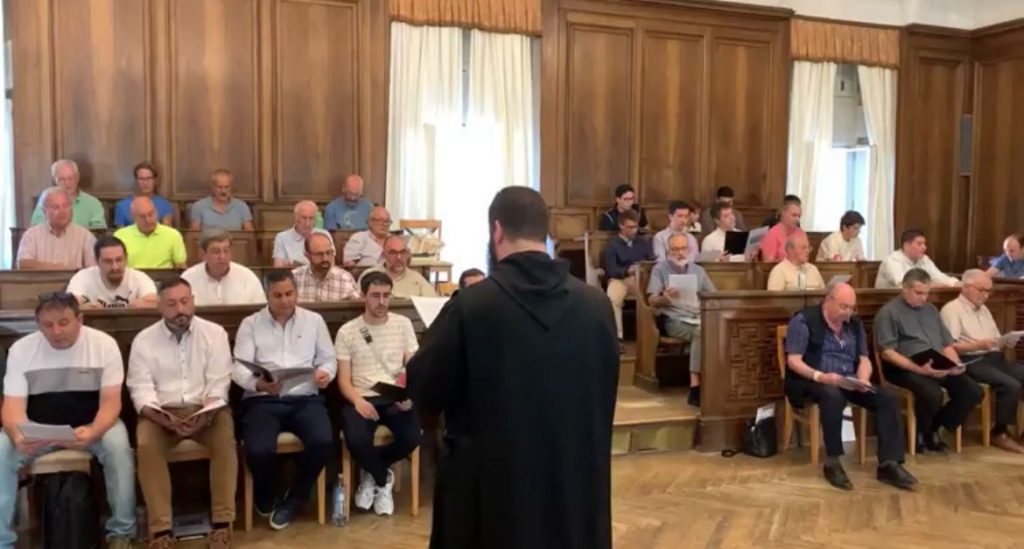
This past August, I studied Gregorian chant in the week-long course of the Benedictine Abbey of the Holy Cross of the Valley of the Fallen with professors and members of the AHisECGre (Asociación Hispana para el estudio del canto gregoriano). Neumz was the sponsor of this 45th-year week of studies. The Neumz application was also made accessible and utilized as a pedagogical tool for the study of psalmody at the beginner’s level. The app was very helpful for me because Gregorian chant is fairly new in my life. After experiencing a personal dilemma as a liturgical musician and feeling that the liturgy is missing nowadays the universality, sanctity, and beauty that Pope Pius X wrote about in his Motu Propio Tra Le Sollecitudini, I decided to register at the beginner level.
I have been a liturgical musician for almost 30 years. I lacked knowledge of Gregorian chant in general because I was hardly ever exposed to this kind of music at my home parish and college. Registering for a course like this has been one of the greatest and most enlightening decisions in my life as a music minister. As a beginner, the members of the AHisECGre offered my classmates and me an intense course load that included Introduction to Neumatic Notation and Interpretation, Music Liturgy, Spirituality, Salmody, Semiology, Gregorian Chant Music Appreciation, and the rehearsals for daily Mass and Vespers. Thankfully, we had the wonderful opportunity to study this year with amazing professors such as Santos Carmelo Santamaría, Manuel Alberto Díaz-Blanco, Vicente Urones, Fray Javier Martin, Fray Juan Pablo Rubio, Susi Ferfoglia, and Fray José Ignacio González. We learned from them valuable lessons on how to offer to God and put into practice our knowledge and spirituality in the Sacred Liturgy.
It was surprising to see Catholics of all ages, amongst which were seminarians, priests, consecrated sisters and brothers, and laypeople. I must also emphasize that there were a lot of young people. Furthermore, some were experienced members of scholas of parishes and professional musicians who have been attending this event for more than 30 years. It was inspiring and humbling to those of us who were at the beginner’s level, to see such love and dedication for the music that holds the primacy in the Catholic Church. Their singing skills led some beginners to ask if they were ever going to become as knowledgeable and great as them. But, our Professors emphasized the importance of praying, serving, and glorifying the Eternal Father with all of your hearts. This is exactly what occurred during the week in the liturgical celebrations. The most knowledgeable guided those of us who knew less. “Then astonishment seized them all and they glorified God, and, struck with awe, they said, ‘We have seen incredible things today’” (Luke 5:26).

At the Benedictine Abbey of the Holy Cross, under the direction and guidance of Fray Javier, there is a boys’ schola called the Escolanía del Valle de los Caídos. We had the opportunity to learn firsthand how one directs, assigns solo parts, and teaches Gregorian chant to children, and we saw the minors’ response and respect in the moment of the Liturgy. The Benedictine monks, our professors (who took turns directing), the older teenage boys of the escolanía, and all of the students made up a schola of almost 100. The truth is that we were all able to glorify God with our voices. Even with my little knowledge, there were chants and prayers in Latin that were familiar. It was a powerful experience and impressive at the same time.
Right after this instance, I understood my role. I recalled that as part of the Body of Christ, we are all called in diverse ways to minister by actively participating in the glorification of God in the liturgy. It did not matter how much I knew at that very moment in Mass, what mattered was that I participated, and I had the support of others who knew more than me. In the end, we offer what we have gathered along our journey of faith and according to our calling. The Church knows that Music plays a huge role in the liturgy and that the active participation of the assembly is not exclusive to musicians only. Therefore, instead of asking whether we will become as knowledgeable and great as our brothers and sisters, I believe that we should ask, “Does Gregorian chant concern me?” The answer is yes. We must also know and understand that music in the liturgy is everyone’s business. Our knowledge and relationship with God and our Church increase with self-discipline in prayer, and Gregorian chant is a liturgical prayer. To my understanding, this is the best reason why we participated in this course, and should feel motivated to participate in opportunities like this one. The rest will happen according to our possibilities and how many opportunities the Church grants us to incorporate Gregorian chant in the liturgy. Yes, we can use Gregorian chant as a form of prayer, to improve our relationship with God, and to seek peace privately, but it will not cause the greater universal effect as if it is put into practice in its place of origin: the Sacred Liturgy.
The study and application of Gregorian chant should not be an individual matter, because it is not a one man’s job. I witnessed and confirmed this during the week of Gregorian chant studies. We learned so much! There is a genuine concern and frustration amongst all and it was stated, “The people want to listen and sing more Gregorian chant at Church.” For this desire alone, which I believe comes from the Holy Spirit, I will return to study Gregorian chant and use it as my source of prayer, even if it is not always permitted to be sung at our parishes.

